Yahya Sinwar, Gaza’s iconic freedom fighter, was also an intellectual, writer and thinker
By Humaira Ahad
Yahya Sinwar is celebrated around the world as a hero and symbol of resistance for free and honorable people, recognized for his lifelong commitment to the Palestinian liberation cause.
In his final moments, the leader of the Gaza-based resistance movement Hamas was seen in military attire, draped in a keffiyeh, and facing Israeli forces in southern Gaza’s Rafah city.
He went down fighting like a true warrior and refused to retreat or surrender, immortalizing himself as a freedom fighter and leader of the resistance movement who led from the front.
However, Sinwar was more than a fighter and warrior. He was an intellectual par excellence, a prolific writer, a multi-linguist and an astute thinker and philosopher.
The Israeli occupation, which held him in jail for many years, struggled to understand his mind and decipher his thoughts, as his intense and piercing gaze revealed very little.
During his years in Israeli prisons, Sinwar delved deeply into studying Israeli settler society and the machinery of the occupation. His deep insights led him to grasp Israel’s internal challenges.
Long before Operation Al-Aqsa Storm shook the foundation of the illegitimate regime, he told an Israeli official that Israel’s strength was not sustainable, as it was innately fragile.
“Fissures between the Zionist entity’s religious and secular populations would deepen. After twenty years, you will become weak, and I will attack you,” Sinwar said at the time.
Israeli political and military analyst Amos Harel wrote in Haaretz: “The sense in Israeli society is that we are going down the drain, and Sinwar helped drag us there.”
Coming from a modest background, Sinwar’s name ranks among the prominent Palestinian leaders of the 21st century. He dedicated his life to the struggle for his homeland's freedom.
He lived for the Palestinian cause and sacrificed his life for the same cause.
Sinwar’s education
Palestinians have a longstanding cultural and educational heritage dating back to antiquity, writes noted Palestinian historian, Nur Masalha in his book, Palestine Across Millennia: A History of Literary, Learning and Educational Revolutions.
He refutes Zionist narratives portraying Palestine as a “black hole” devoid of literacy and education and documents Palestine as a vibrant center of classical education in Sumerian, Proto-Canaanite, Greek, Syriac, Arabic, Hebrew, and Latin.
After occupying Palestine, Israel imposed stringent restrictions on Palestinian education, preventing those in the occupied territories from following the tradition of learning and knowledge.
In Gaza, independent university buildings were prohibited, with classes held in tents due to bans on construction materials. Such measures, enacted as early as the 1970s, much before the complete blockade in 2007, underscored Israel’s constraints on Palestinian educational growth.
Hurdles were put at every point in the development of higher education institutes. The universities were not given licenses. All colleges were issued with a temporary license that needed annual renewal.
The simple act of attending a university became a struggle. Education became an act of peaceful defiance. Attending university symbolized resistance, as the occupation targeted all aspects of Palestinian life, including education.
For Sinwar, the university became a sanctuary where he could imagine liberation and nurture his aspirations. It was at the university that he gained hope, strength, and a commitment to resistance.
He earned a bachelor’s degree in Arabic language and literature from the Islamic University of Gaza, shaping his literary skills. Literature helps reflect on human experiences, giving insight and context into societal norms and traditions. It helped Sinwar explore the history of his homeland.
It gave him insight into the present that is shaped by the past, providing the goad to plan for the future.
Sinwar’s love for literature contributed to his reputation as a writer. He authored and translated five books to help future generations understand Palestinian resistance against the Zionist occupation.
Sinwar’s time in prison
First arrested at 19 in 1982, Sinwar faced multiple arrests over the years, including a 1988 sentence to four life terms. After 22 years in jail, he was released at age 49 in a 2006 prisoner exchange for Israeli soldier Gilad Shalit.
For Sinwar, the prison was an “academy” where he refined his resolve. He became fluent in Hebrew, immersing himself in Hebrew literature to better understand the enemy’s psyche.
Sinwar gained insight and contemplated the world during his time behind bars. Considering prison a miniature life for the occupation society, he began following the Hebrew media from inside the jail and read intelligence studies issued by security officers and politicians in Israel.
“It was quite clear that he (Sinwar) was a kind of calm and decisive leader," and that he "read the strategy of the Shin Bet leaders" according to the rule of "know your enemy,” a former chief of Israel’s notorious spy agency, Shin Bet, was once quoted as saying.
The legendary Palestinian resistance leader studied books about Zionist theorists, politicians, and spy chiefs. He took notes on his reading in meticulous handwriting, filling thousands of pages in journals, to be distributed among fellow prisoners.
“Prison builds you, especially if you are Palestinian because you live amid checkpoints, walls, restrictions of all kinds,” Sinwar told an interviewer in one of his interviews from jail.
“Only in prison do you finally meet other Palestinians, and you have time for talking. You think about yourself, too. About what you believe in, and the price you are willing to pay.”
In an interview widely circulated at the time, Sinwar told Israeli journalist Ehud Yaari to speak in Hebrew when the latter tried conversing in Arabic while interviewing him in prison.
“No, speak Hebrew. You speak better Hebrew than the wardens.” Sinwar knew Yaari through the news he had been following on Israeli television.
Despite the length of his sentence, Sinwar’s commitment to resistance did not falter. Throughout his time in the jail, he prepared for his release and the resumption of armed resistance.
Once asked to compare his life in jail with his life as a leader in Gaza, Sinwar said: “I have only changed prisons. And, despite it all, the old one was much better than this one. I had water and electricity. I had so many books. Gaza is much tougher.”
Sinwar’s books
In one of the surprise searches in an Israeli prison, a book was found in Sinwar’s possession. The book was handwritten and the number of pages ranged between 500 and 600, confirming that he was translating it for Palestinian prisoners, Yaakov Perry, the former chief of the Shin Bet said about Sinwar, describing his determination even inside jail.
The resistance leader's literary journey began with the translation of former Shin Bet chief Carmi Gillon book, “The Shin Bet Between the Schisms.” The book was translated from Hebrew to Arabic and deals with the role of the spying network in the occupied territories.
Sinwar wanted the Palestinians to learn extensively about the workings of the notorious Israeli spy agency and devise resistance plans and strategies accordingly.
Sinwar studied Israel’s spying system extensively and deeply. He also translated Perry’s book “He Who Comes to Kill You, Preempt and Kill Him”.
In 1992, Sinwar translated the book “Israeli Parties”. The book is about differences between various political parties in the occupied territories.
Sinwar’s goal in translating the book was to introduce domestic Israeli politics to Arab readers. He highlighted the role of Israeli political parties in the occupation machinery.
Sinwar’s magnum opus “The Thorn and the Carnation” was completed after 15 years in prison.
The book was smuggled out of the prison with the help of dozens of fellow prisoners who operated like an ant colony, as described in the foreword to his novel.
“The Thorn and the Carnation,” is a semi-autobiographical book that offers glimpses of Sinwar’s life within the broader context of the Arab-Israeli conflict.
“The Thorn and the Carnation” follows a Palestinian family living in Gaza’s al-Shati refugee camp after being forcibly expelled from Majdal Asqalan in the occupied territories in 1948.
The narrator of the story Ahmed is the youngest grandson in the family.
The novel chronicles the family’s struggles caused by the disappearance of their father and uncle and deals with political events spanning 37 years. It also mentions the harsh conditions of refugee camps
The eldest son of the family joins the Fatah movement, while the other siblings work with the Islamic resistance. One of the brothers, Ibrahim, is Sinwar’s alter ego in the novel. Ibrahim's intelligence and skills make him adept at tracking Israeli informants and deciphering the codes they use to communicate.
The novel beautifully weaves personal and historical events, documenting key milestones of Palestinian history from 1967 to the early years of the second intifada at the beginning of the 2000s.
Although the novel was completed more than two decades ago, it comes up as a detailed narrative of life in the besieged strip and offers insight into the current war on Gaza.
Sinwar’s book highlights that Israel’s ongoing genocidal war on Gaza is a brutal reiteration of the same tactics and policies that the regime has been employing since the time depicted in the novel.
In the novel, Ibrahim who is reluctant to marry finally gives in to his family’s pressure. However, he tells them that he will not abandon his work with the resistance, even if it costs him his life or his freedom, or leads to his children becoming orphans. The lines reflect Sinwar’s real-life story.
The novel was followed by his second book, “Majd,” or “Glory” which explores the operations of the Shin Bet. It was published in 2010.
The book explains the spy agency's way of collecting information, and its mechanism to pressurize people to be Israeli agents. It explains the Israeli assassinations carried out against resistance leaders.
Sinwar also mentioned Israel’s brutal mechanism to extract information from prisoners.
Sinwar's last book was "Hamas: Trial and Error." This book discusses the development of Hamas as a resistance organization. He talked about the importance of the resistance group in the fight against the Israeli occupation and also anticipated Hamas’s bright future.
Lindsey Graham urges Trump to ignore aides opposing war on Iran
Far-right, anti-Islam protest sparks counter-protests in Manchester
Press TV's news headlines
Sudan’s mining sector suffers $7 billion loss amid ongoing civil war
Ansarullah slams Israel’s massacre in east Lebanon, urges unified Arab action
Iran resolved to uphold nation’s nuclear rights via diplomacy: FM Araghchi
The erasure of Palestinian cultural legacy by British Museum
American citizens have borne the ‘lion’s share’ of Trump’s tariff costs: Economist


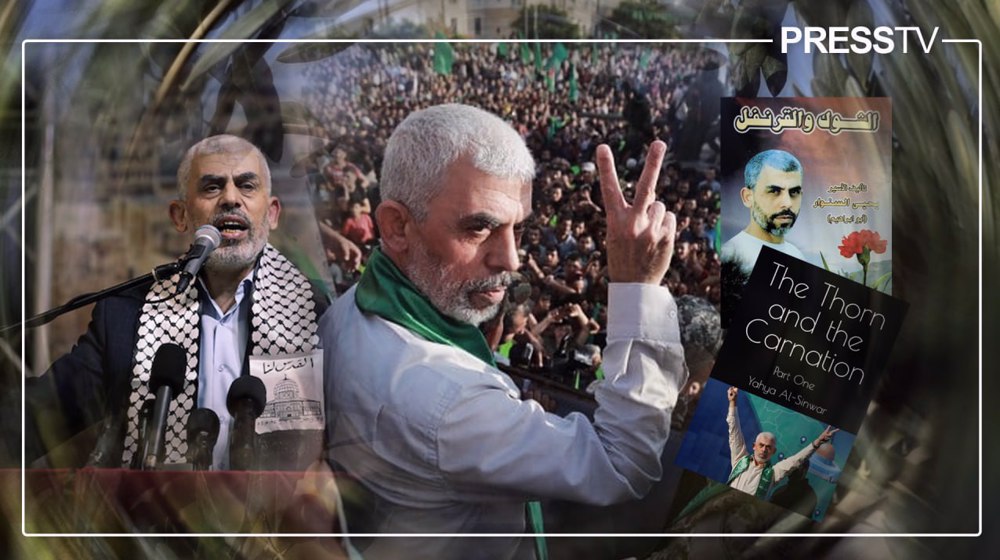
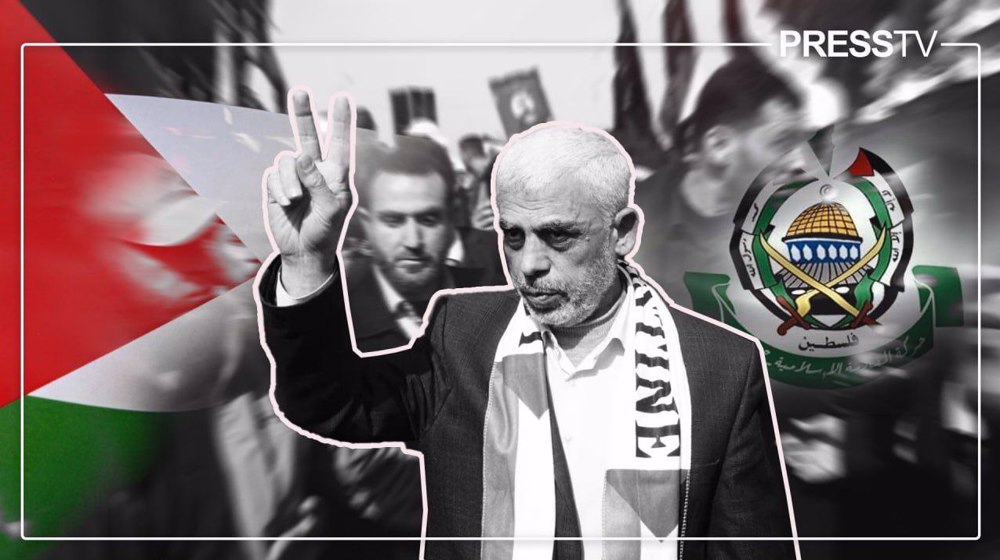
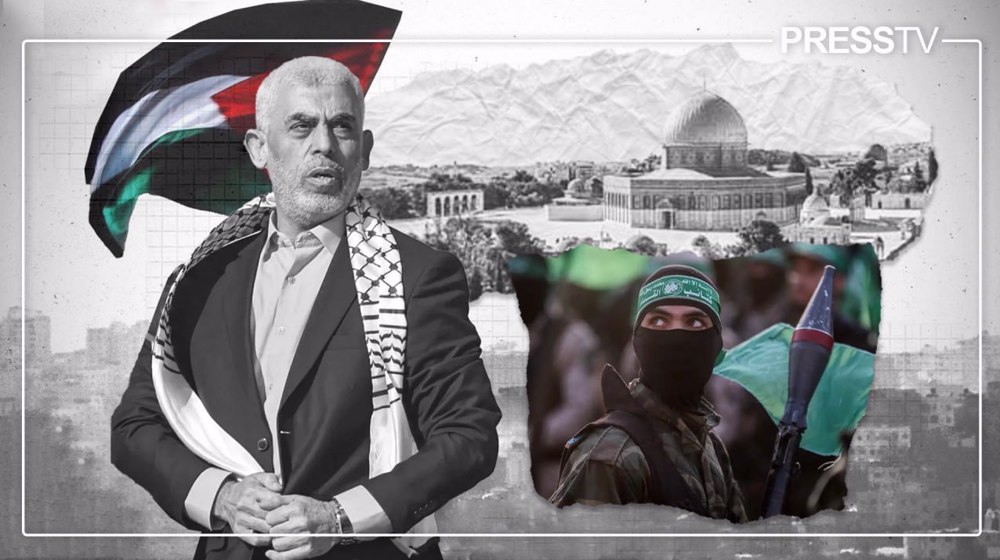
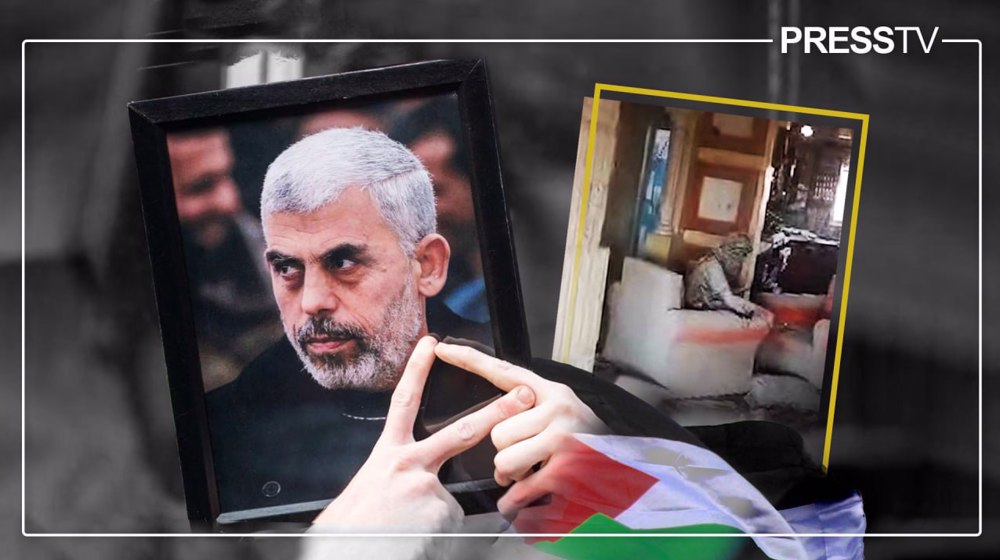
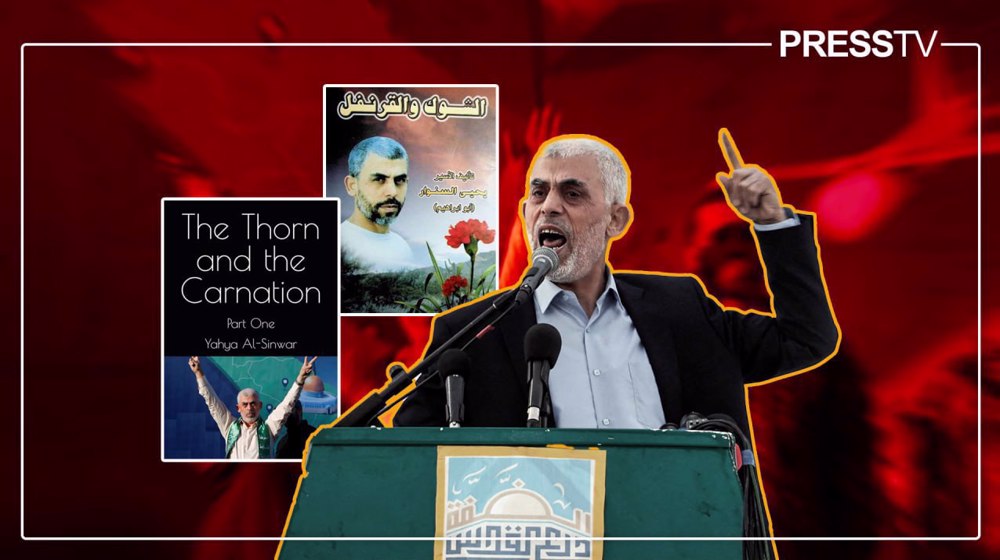






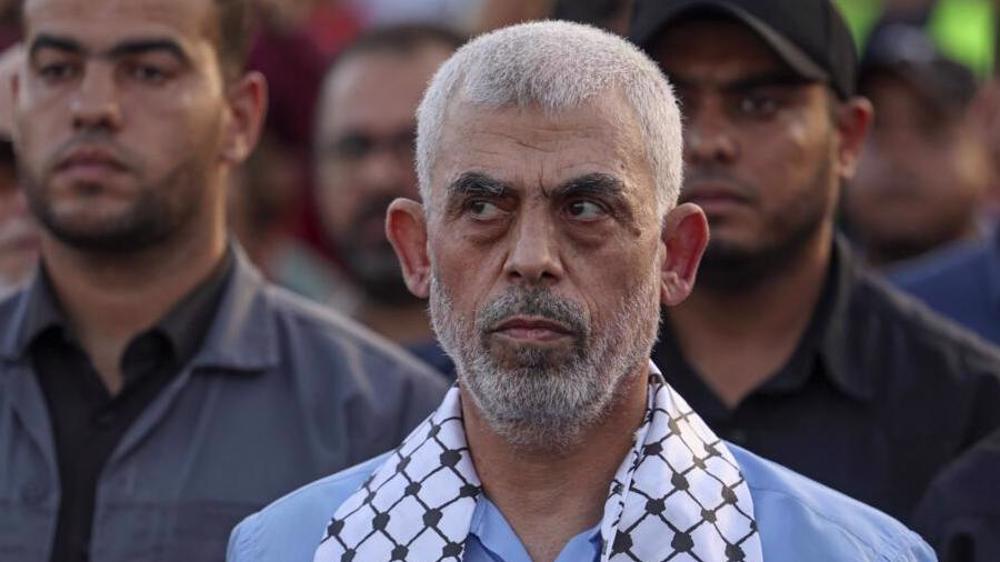
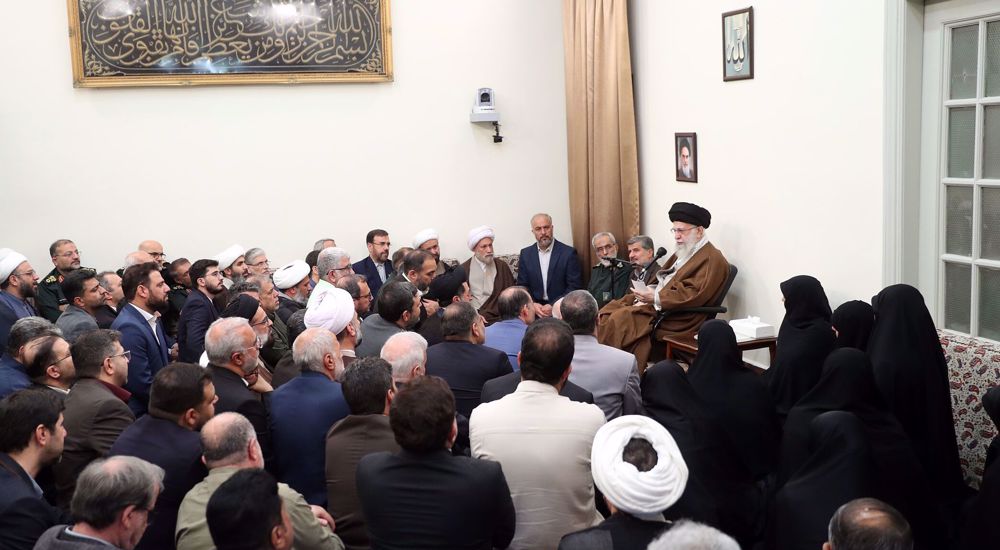
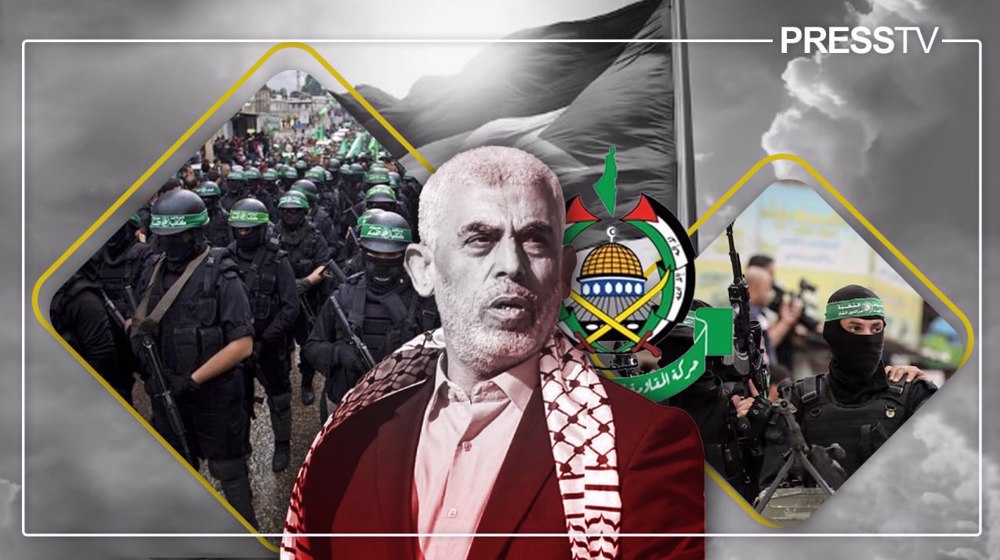
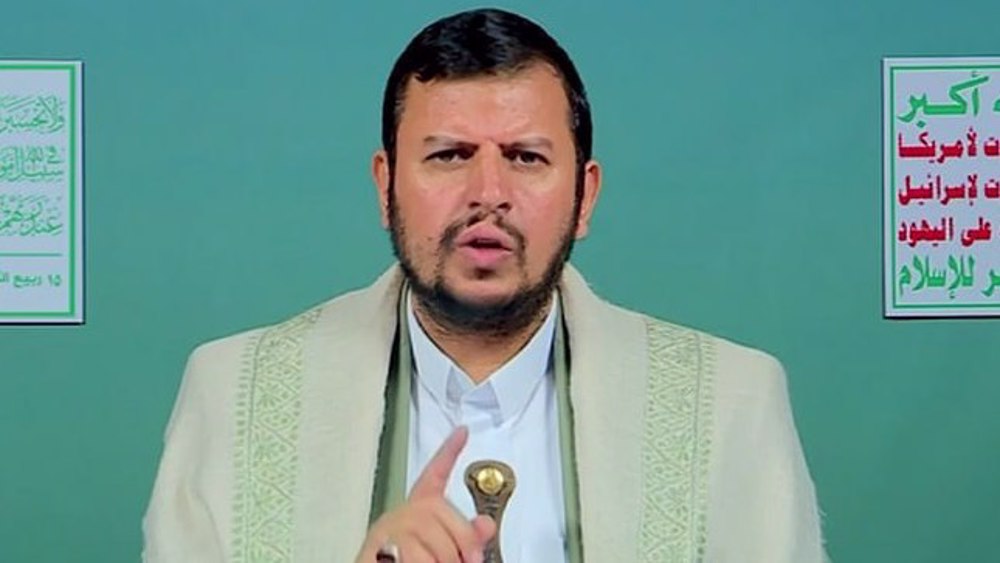
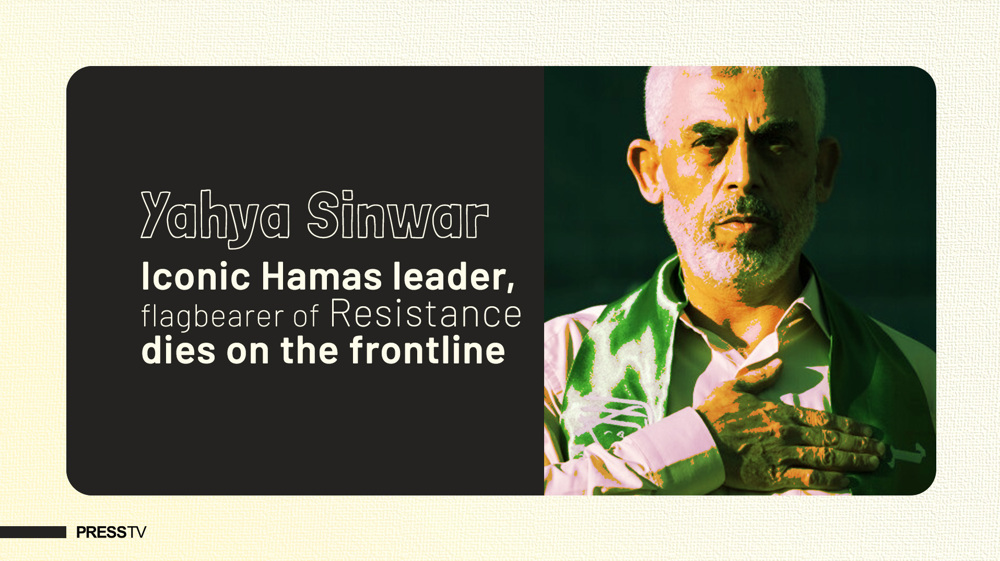

 This makes it easy to access the Press TV website
This makes it easy to access the Press TV website